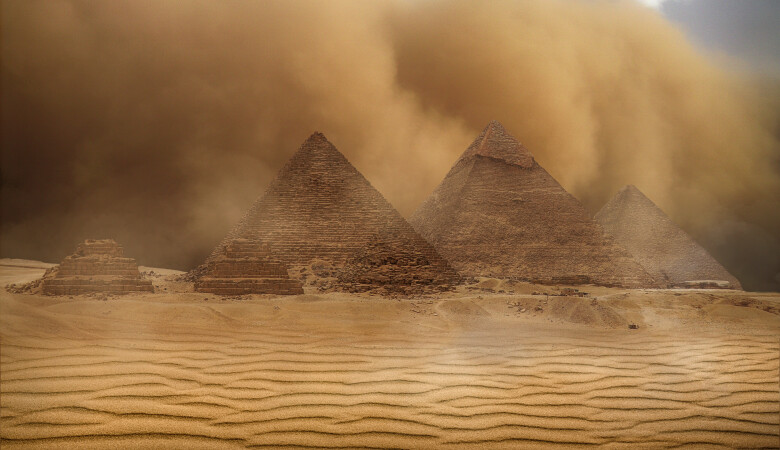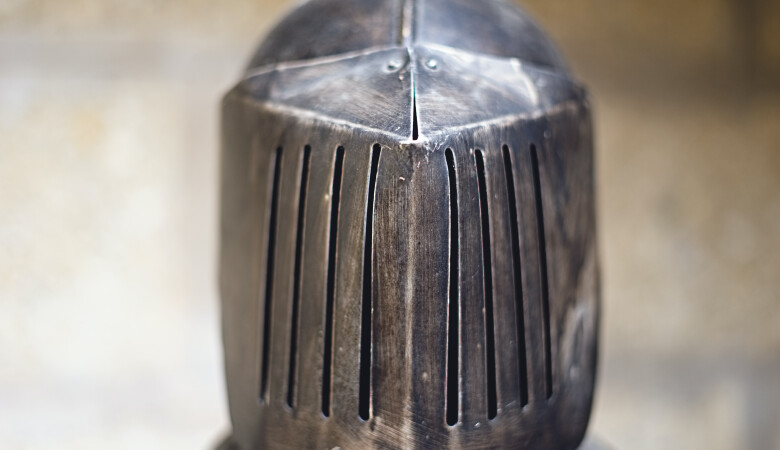The End of the "World": Babylon's Future Destruction (Isaiah Sermon 13 of 80)
August 03, 2008 | Andy Davis
Isaiah 13:1-22
Judgement Day, Judgment, Prophecy
Pastor Andy Davis preaches a verse by verse expository sermon on Isaiah 13:1-22. The main subject of the sermon is the total destruction of the Babylonians brought about by God.
- SERMON TRANSCRIPT -
Introduction
We are aware from scripture that we have a personal enemy who seeks our very lives. His name is the devil or Satan, that ancient dragon. It says in 1 Peter 5:8 “Be self-controlled and alert. Your enemy the devil prowls around like a roaring lion looking for someone to devour.” But the scripture reveals that we have an impersonal enemy as well, one that surrounds us at every moment and threatens our souls as well. In 1 John, Chapter 2:15-16, it is called “the world.” “Do not love the world or anything in the world. If anyone loves the world, the love of the Father is not in him. For everything in the world – the cravings of sinful man, the lust of his eyes and the boasting of what he has and does – comes not from the Father but from the world.” The world and its desires pass away. A man who does the will of God stands forever. We’re surrounded by the world, and by that, John means, I think, the world’s system. Not the created world that God made and all of its beauty, but the world system, that alluring, powerful, enticing, wicked culture that attacks our very souls and seeks our eternal destruction.
The world is made up of living, breathing people whose minds are controlled by the flesh and by the spirit of the power of the air, Satan. These people, as they live out their convictions, as they live out their world views, they craft a world around us that is enticing and luring us away from the things of God, away from Christ. Some of them have political and military ambitions to rule and dominate, perhaps a non-Christian politician running for office, or an Al-Qaeda terrorist masterminding the next terrorist attack somewhere in the world, or the publisher of a pornographic magazine, or an actress willing to do anything in a movie to further her career. It could be a marketing consultant urging a bolder approach to marketing clothing to teens in malls, or a financial expert writing a column on how you can be far richer than you ever dreamed if you just follow his approach of investments, or a motivational speaker telling spellbound audiences ten irrefutable laws for success the way he defines it. And a hundred, even a thousand other enticements are pulling you away from Christ. That’s the world. It’s a seething culture of unbelief, pulsating with the lusts that John mentions: lust of the eyes, lust of the flesh, pride of flesh. It is vicious. It is relentless. It is alluring and enticing. It is a cold-hearted enemy to your soul. It would have you. It would pull you away from Christ. It has a symbolic name in the Bible, and that name is Babylon.
Now I know that Babylon was a city in ancient Mesopotamia on the Euphrates River. From it arose a mighty empire that, for a time, dominated the world. From that empire came an army that conquered Jerusalem, tore down its walls and burned the temple of God. I’m aware of all that. It was the enemy of the people of God at that time, Babylon. Isaiah 13 clearly predicts the fall of that literal city of Babylon to the Medes in 536 BC. That’s predicted here in this chapter. But Isaiah 13 uses language that soars far above that one event in history. It speaks of God’s wrath poured out on all nations to the point where you can’t even see the celestial beings anymore. The sun, the moon, and the stars are darkened. It’s language that goes right to the end of time.
Isaiah 13 speaks of God’s relentless wrath poured out on Babylon, the enemy of His people. It’s fulfilled again and again and again and again in history, not just in one date, one time, 536 BC, but again and again, because from the smoldering ashes of one destroyed Babylon rises the next Babylon. Like a wicked phoenix, from the ashes up it comes to defy God and to attack God’s people. It happens again and again, and God is always against it. He controls that rise. He fights against it and throws it back down. And then the next Babylon comes along. So it is. And not until the end of the world will the final Babylon, the spirit of Babylon, and Babylon itself be crushed forever.
In Revelation 17, it depicts Babylon as a harlot riding on a beast with seven heads and ten horns. So you have pleasure plus power. That equals the world to me. That’s what it is. There’s going to be a final form of Babylon, and it will be crushed forever by the glory of the second coming of Christ. No more Babylon, friends. No more world the way John means in 1 John 2. We’ll be free forever and we will live in a pure world where Jesus will reign. There’ll be no enticements away from God, only powerful inducements to worship and to love Him forever. God is going to crush Babylon. That’s exactly what He’s talking about in this very serious and sober chapter. It’s not an easy chapter to read. It’s not pleasant. Yet it is joyful for us as the people of God to know that our enemy is God’s enemy too and that He will rise up and crush it someday
God’s Sovereign Rule Over the Nations: Isaiah 13-23
One Central Theme, Many Smaller Oracles
As we enter a new section of Isaiah’s prophecies, Isaiah 13-23, these are oracles against the nations, about eleven chapters or so of oracles against the nations, one after the other. Isaiah in these chapters (really throughout the whole book) portrays a God who sits on His throne and rules over the events of history 24 hours a day, 7 days a week. He is working all the time to bring about His plan. It says, right in this oracle section, in Isaiah 14:26-27, “This is the plan determined for the whole world; this is the hand stretched out over all nations. For the Lord Almighty has purposed, and who can thwart him? His hand is stretched out, and who can turn it back?” God is in charge. That is a powerfully vital message for our time, when we’re barraged by a constant stream of news stories that can discourage you as a Christian and beat you down. Reading CNN, looking at CNN, or going to websites can be discouraging. You’re looking at Fox News or one thing after another, a constant stream of stories that gives you the sense that the world is spinning out of control. Well, it isn’t. The message of the oracles in these eleven chapters is that our God reigns. And the message of this first one is that God is against Babylon in any of its forms. He will destroy it in the end. So, we see God’s sovereign rule over the nations.
We begin with this oracle against Babylon. We’re going to go from that to oracles against the Philistines in Chapter 14 and against Moab in Chapters 15 and 16. We’re going to look at oracles against Syria and Ephraim in Chapters 17 and 18, Egypt in Chapters 19 and 20, and back to Babylon again in Chapter 21. Edom and Arabia are also in Chapter 21, and finally Tyre is in Chapter 23. These are oracles against the nations. In all of this, God’s going to give clear messages to His people. That’s us and them. The message is, first of all, do not trust in the strength or be allured or enticed by the strength of the nations and the peoples you see around you. Do not put your trust in them. Do not make alliances with them. Don’t put your hope in them. They are just nations. They are as a drop in the bucket, and they will be swept away in the end. The insight here again and again is that that there’s no righteous nation on Earth as we understand a political entity.
God’s wrath is against all of them, every one of them. He says very plainly in Isaiah 34:2, “The Lord is angry with all the nations; his wrath is upon all their armies.” That’s something good for us to consider, isn’t it? He’s against them all. Friends, our citizenship is in Heaven. That’s the message of the oracles of these nations. Also, do not question God’s justice when, for a short period of time, a godless people seem to be dominant and ascendant. He’s seen it before. We will see it again and again. God reigns even then. He is not unjust and God cannot be mocked. Judgment Day, the Day of the Lord, mentioned here, will come to them. So for us, as a people of God, trust in Him. Fear God and keep His commandments. Walk in His ways. Pray for the advance of His kingdom. That’s what I get out of the oracles of the nations. That’s a general introduction to the new section of Isaiah that we’re coming to.
Isaiah’s Far-reaching Vision
Let’s look specifically here at Isaiah’s far-reaching vision when he talks about Babylon. Look at verse 1, an oracle concerning Babylon that Isaiah son of Amoz saw. Many modern scholars seriously question whether Isaiah wrote these chapters. I love it and I don’t; I hate it. But I read it and I wonder how they come up with these things. What they say is that, at the time that Isaiah wrote, 725 BC, Babylon was really nothing. It was just a minor city with some people around it (the Chaldeans) and they were under the boot of the Assyrians like everybody else. So, it’s like Isaiah made a mistake prophesying against Babylon. They were nothing. It was Assyria that was the threat. Well, he’s dealt with Assyria and we’ve seen all that. But now he’s turning to Babylon. It’s no mistake friends. And it wasn’t written after the fact, friends. Not at all. It was written in 725 BC or thereabouts. Babylon and the Medes that are mentioned in this chapter are actually small allies, chafing under the Assyrian yoke. Isaiah is predicting the fall of Babylon to the Medes. Look at verse 17, the Medes are specifically mentioned. He names the people that are going to topple Babylon before either one of them are powerful enough to do anything about it.
That would happen one hundred and eighty-nine years after this oracle was given, almost two hundred years later. Can God do that? Can He make that kind of a specific prophecy that far in advance? We Christians, we know the truth. He actually can look seven and a half centuries ahead and talk about Jesus who died as an atoning sacrifice for our sins. “He had no beauty or majesty to attract us to him; nothing in his appearance that we should desire him. He was despised and rejected by man. A man of sorrows, and familiar with suffering.” “We all like sheep, have gone astray, each of us has turned to his own way; and the Lord has laid on him [on Jesus] the iniquity of us all.” (Is 53:2-3;6) Can Isaiah look into the future and see that kind of detail? Absolutely he can! Can he see that Jesus would be buried in a rich man’s tomb and then raised? He can see all that. He can see whatever God shows him, for God knows the future.
God’s Sovereign Plan the Central Theme of History
He says in Isaiah 42:9, “See, the former things have taken place, and new things I declare; before they spring into being I announce them to you.” This is the power of God. He knows the future. He doesn’t just know the future, He decrees the future and He declares the future! This is what God does. This is the plan determined for the whole world, and God is making it happen. So Isaiah has a far-reaching vision to look ahead one hundred and eighty-nine years from when he was living to the fall of an empire at a city that wasn’t even powerful in his day. He can do that.
Babylon’s Symbolic Role in Redemptive History
Babylon the Ancient Leader in Human Rebellion
Babylon has a symbolic role in redemptive history. Anyone who’s read through the Bible has bumped into Babylon again and again. It’s not just one time. The key question as we look at Isaiah 13 is “If Babylon isn’t even the issue at this point, if the real threat is in Assyria, then why does God give such a prominent place to the prediction of the fall of Babylon?” That’s a good question.
Babylon was the ancient leader in human rebellion among the nations. The nations derived their origin from the time when, in Babel, a tower was being built: the Tower of Babel in defiance of the command of God. God came down and confused the languages and that was the beginning of the nations. Babel became Babylon. It’s the same location. That’s where it was. That’s the origination of that national rebellion against God.
Babylon the Leader in Human Empire-Building
Babylon was also what we call the Neo-Babylonian empire. In the time under Nebuchadnezzar it was a leader in world empire-building. There had never been an empire like it. The cultural level of Babylon was much higher than that of Assyria. It mentions the nobles in our text here. We’ll talk more about that. But Nebuchadnezzar’s achievements were astounding in building Babylon to its level of human glory. We’ve got the famed Hanging Gardens of Babylon and all of the structures there. It’s just a magnificent place.
Furthermore, the city of Babylon was mighty and powerful. It seemed invincible: 14 miles square, huge outer walls, which Herodotus tells us were 87 feet thick and 350 feet high. That’s a 35 story building! There were 100 great bronze gates in the walls and a limitless water supply, so they believed. Crops were able to be grown within the walls. You can’t conquer this city. You don’t have an army big enough to go fourteen miles on a side all the around to shut it up tight like a cork. You can’t do it. Even if you could, they could outlast you. They’ve got crops inside. They’ve got farmers. They’ve got water. They’ll just laugh at you, 350 feet above you. You’re not going to be throwing anything over the wall and you’re not going to burrow through it. There’s no way it could fall, so they believed. Babylon was the arrogant symbol of opposition to almighty God.
Babylon the Symbol of Human Opposition to God
In the New Testament, Peter makes a not-so-obscure reference to Babylon. At the end of his epistle 1 Peter 5, he says this, “She who is in Babylon, chosen together with you, sends you her greetings, and so does my son Mark.” Church tradition tells us he wrote that from Rome. Why does he call Rome, Babylon? I told you, out of the ashes rises the phoenix of another world-conquering, God-hating empire. And that was Rome in Peter’s day. Even after Rome falls, there’s another one, another Babylon that keeps coming. It’s going to keep right on going until the end. Revelation will pick up on this Babylon theme, as we’ll talk about later in the message. But in Revelation 17, as I’ve already mentioned, and in 18, Babylon is there when Jesus returns. And He destroys it.
God Summons an Army Against Babylon
God’s Activity Central
But here in Isaiah 13 we’re focusing on the first empire, the Babylonian empire and the city of Babylon. One hundred and eighty-nine years before it happens, the prophet Isaiah is predicting its fall. By the way, this is one of the most predicted events in history. It’s predicted here in Isaiah 13. It’s predicted in Isaiah 21. It’s predicted for five chapters towards the end of Jeremiah very specifically. It’s predicted in Habakkuk Chapter 2 very plainly. The details are astounding. I already preached through this. It’s recorded for us in Daniel Chapter 5 on the night of Belshazzar’s feast when the writing appears on the wall and Babylon falls to the Medes. It’s not a minor event in redemptive history. It’s a major one. God is summoning an army against Babylon, and, in this chapter, God’s activity is central. Seven times in this chapter God speaks about what He’s going to do against Babylon. He’s taking it very personally. He’s acting very directly. Look at verse 3, “I have commanded my holy ones; I have summoned my warriors to carry out my wrath – those who rejoice in my triumph.” It’s very personal for God.
Verses 11-13 say, “I will punish the world for its evil, the wicked for their sins. I will put an end to the arrogance of the haughty and will humble the pride of the ruthless. I will make man scarcer than pure gold, more rare than the gold of Ophir. Therefore, I will make the heavens tremble.” Verse 17 even more specifically says, “See, I will stir up against them the Medes.” God raises up the Medes against Babylon. This is very personal for God. He is active and involved. Verses 6 and 9 call it the Day of the Lord. This is the Lord’s day, the day of judgment on the nations. God is acting directly to bring about judgment for His own glory. This is not some random swirling of events in human history that had no purpose, no meaning to it at all, full of sound and fury, signifying nothing. No, this is God, essential actor in history, bringing down judgment on a people who will not acknowledge His name or live through His glory. So God summons an army. That’s how He is going to do it.
An Army Summoned from the Nations
Verses 2-4 say, “Raise a banner on a bare hilltop, shout to them; beckon to them to enter the gates of the nobles. I have commanded my holy ones; I have summoned my warriors to carry out my wrath – those who rejoice in my triumph. Listen, a noise on the mountains, like that of a great multitude! Listen, an uproar among the kingdoms, like nations massing together! The Lord Almighty is mustering an army for war.” God is mustering an army and they’re going to come and destroy Babylon. In ancient times, before radio communication, armies used colorful banners up on bare hilltops to signal across distances. Or they would use signal fires. The nations are massing together. They are organizing to come against the mighty Babylon. Again, it’s no accident. The Lord is mustering this army for war and they’re going to enter, it says, “the gates of the nobles.” These are the Chaldeans. These are the refined Babylonians who exported their Babylonian culture all over their empire. They’re the nobles, the blue bloods, cultured and arrogant. They’re going to be destroyed, all of them. And God calls this personal army to do His will.
They are His warriors. He even calls them “my holy ones.” Strange, isn’t it? Holy in this case means set apart for a purpose and for a job that God’s calling them to do. Later on in Isaiah’s prophecy, He’s going to call Cyrus the Great of Persia “my anointed one.” In Greek, it’s the Christ, the Messiah. Now we know that he’s not the Christ, but he’s anointed for a task. So it says in Isaiah 45:4, “For the sake of Jacob my servant, of Israel my chosen, I summon you by name and bestow on you a title of great honor, though you do not acknowledge me.” Cyrus doesn’t know Yahweh. He doesn’t know the God of Abraham, Isaac, and Jacob. But he’s doing Yahweh’s will, even though he doesn’t acknowledge Him. We’ve already learned that in Isaiah, haven’t we? God raises up instruments to do His will, whether they acknowledge Him or not.
The Day of the Lord
So this army that’s coming, these Medes and these Persians that are coming to destroy Babylon, they’re doing God’s will. This is the day of the Lord. Look at verses 5 and 6, “They come from far away lands, from the ends of the heavens – the Lord and the weapons of his wrath to destroy the whole country. Wail, for the day of the Lord is near; it will come like destruction from the Almighty.” The invasion of this international coalition of armies against Babylon is not an accidental occurrence. God has brought it. There may be human factors, but it is the Lord, spiritually, riding at the head of the army. It cannot be defeated and the reaction will be nothing less than terror. Look at verses 7-9, “Because of this, all hands will go limp, every man’s heart will melt. Terror will seize them, pain and anguish will grip them; they will writhe like a woman in labor. They will look aghast at each other, their faces aflame. See, the Day of the Lord is coming – a cruel day, with wrath and fierce anger – to make the land desolate and destroy the sinners within it.”
There will be a future Day of the Lord. It is described in many places in the New Testament. That Day of the Lord will be like this one only a thousand times worse, a thousand times more intense. In history God just does the same things again and again, like dress rehearsals, and says, “As I did in Sodom and Gomorrah,” or “as I did in Babylon,” or “as what happened with the Romans.” It’s going to happen again at the end, getting us ready for the Day of the Lord. Thus, Isaiah uses extreme language to describe the fall of Babylon, He goes beyond the mere invasion of the city that night, the killing of the Babylonian king and the officials, and the taking over of the city by the Medes and the Persians.
He goes much further than that. Look at verses 10 and 13. It’s language that soars above that current event. It says, “The stars of heaven and their constellations will not show their light. The rising sun will be darkened and the moon will not give its light.” “Therefore I will make the heavens tremble; and the earth will shake from its place at the wrath of the Lord Almighty, in the day of his burning anger.” This is language that is speaking of the end of the world. It’s going to happen again. Babylon will be crushed again, and, at that point, the stars and the sun and the moon aren’t merely going to be darkened, they’re going to be removed. The stars will fall to the earth, it says in the Book of Revelation, as figs from a tree. God is going to clear everything away, and there will be a new heaven and new earth, the home of righteousness.
The Invaders Named
Astonishing Accuracy
In verse 17, Isaiah names the invaders very specifically. This is God saying, “See what I can do? Even the very hairs of your head are all numbered. I know history before it even happens. I can tell you who’s going to destroy Babylon. It’s going to be the Medes.” Look at verse 17, “See, I will stir up against them the Medes, who do not care for silver and have no delight in gold.” This is astonishing accuracy. As I mentioned, at the time Isaiah wrote, the Medes were no major player on the world scene. Like the Babylonians, they were conquered people under the yoke of the Assyrians. Who were the Medes? They were people living in what is now central Iran, east of Mesopotamia. They inhabited the Zagros Mountains and the high plateaus east of that mountain range. That’s where they came from. As early as 836 BC, the Assyrians referred to them as a threat, as enemies. In 612 BC, they joined together with the Babylonians in helping to crush what was left of the dying Assyrian empire. Assyria’s time was over and the Medes and Babylonians came together and went up the Fertile Crescent and crushed Nineveh. It’s predicted. Assyria is done, finished for good, and the Medes and Babylonians kind of joined together in doing that. But the Babylonians took over under Nebuchadnezzar. They were stronger at that point, and the Medes were subjugated. They were crushed under the Babylonian empire.
Single-Minded Weapons of Wrath
God declares in advance that once Babylon’s time has passed, the Medes will rise up and it’ll be their turn. They’re going to crush Babylon. Look at them, they’re a single-minded weapon of wrath. Verse 17-18, “See, I will stir up against them the Medes, who do not care for silver and have no delight in gold. Their bows will strike down the young men; they will have no mercy on infants nor will they look with compassion on children.” First of all, they can’t be bought off. You can’t send out a box of silver and gold and they go home, back to where they came from. They’re going to get it all. They don’t want one box. They want everything you have, Babylonians. They’re not going to be bought off that way. They’re ready to exact vengeance. They’re filled with wrath. They’re filled with rage. And they’re going to kill everyone. There’s a mercilessness here. Even the infants and the children, they’re not spared.
Desolation Decreed… Then Fulfilled (vs 19-22)
The Reason for Judgment: Pride
The desolation that is decreed and then fulfilled in verses 19 through 22 comes as an act of judgment by God. Why does the judgment come? Well, the central reason is always the same; it’s pride. It’s the arrogance of the Babylonians. He’s going to crush them because of their pride. Look at verse 19, “Babylon, the jewel of kingdoms, the glory of the Babylonians’ pride, will be overthrown by God like Sodom and Gomorrah.” Isaiah 2 has already displayed how much God hates human arrogance, pride, and boasting. Anything that goes up, anything that gets lofty in defiance of God, He wants to throw down. And in due time, He will. Here, Babylon is called “the jewel of kingdoms, the glory of the Babylonians pride.” It was for this very reason, as you remember, that Nebuchadnezzar was struck with insanity for seven years. Do you remember the King of Babylon? The Babylonian emperor is walking on the roof of his palace and feeling pretty good about his life and his achievements. “Is this not the great Babylon I have built as the royal residence by my mighty power and for the glory of my majesty?” He’d already been warned about this kind of thing a year before by Daniel. Even while the words are coming out of his mouth, an angel speaks and decrees. And God strikes. In that same day, he is driven away from people and goes out and starts eating grass like cattle for seven years. He’s like that until God grants him repentance and enables his sanity to come back to him. He lifts up his eyes toward heaven and he praises the Most High. He learns his lesson. He is able to be humble.
The Horror of the Judgment
Well, Nebuchadnezzar learned it, but Babylon didn’t. Babylon didn’t learn it. Babylon is an enemy of God. It will fight against God forever. So if he won’t be that way, he’ll be replaced, and another king will come along who’ll rule Babylon. He’s going to get soft. And look at the horror of the judgment in verses 14 through 16, “Like a hunted gazelle, like a sheep without a shepherd, each will return to his own people, each will flee to his native land. Whoever is captured will be thrust through; all who are caught will fall by the sword. Their infants will be dashed to pieces before their eyes; their house will be looted and their wives ravished.” Destruction, this is what the next Babylon does to the last Babylon. It’s what they do.
Unfolding Judgment: Babylon Becomes Desolate Gradually
They’re going to get judged when Alexander the Great comes. Then he is going to get judged. And the Greeks are going to get judged when the Romans come. And on and on it goes, one Babylon after another, bringing this kind of destruction. Look at the judgment, the desolation that’s predicted. Look at verses 20 through 22, speaking of Babylon, “She will never be inhabited or lived in through all generations; no Arab will pitch his tent there, no shepherd will rest his flocks there. But desert creatures will lie there, jackals will fill her houses; there, owls will dwell, and there, the wild goats will leap about. Hyenas will howl in her stronghold; jackals in her luxurious palaces. Her time is at hand, and her days will not be prolonged.” Desolation has been decreed for Babylon. No one will live there ever again. It will be leveled and it will never be rebuilt. Now obviously, if you take that literally, then how do you end up with Babylon all the way at the end of the world in Revelations 17? Well, the city itself on the Euphrates River is crushed and it has not been rebuilt. According to this, it never will be. But the spirit of Babylon lives on and it keeps floating from place to place, landing, coagulating in a human empire, and then the next Babylon rises. The last one will be that of the Antichrist, as he organizes the whole world in rebellion against God.
So, Babylon continues to live even while this city will never be rebuilt. This decree was fulfilled in stages. It didn’t happen all at once. Cyrus the Persian invades. In 538 BC he comes in and takes the whole empire except the city of Babylon. Darius the Mede (he’s got to be a Mede, of course) comes with the Medes to Babylon itself, and they get in. Jeremiah predicted very plainly, “I will make her officials, her leaders drunk and they will lie down and sleep and never wake up.” This couldn’t be plainer. He also says in Jeremiah, “I will dry up her streams.” What ends up happening is the Medes dried up the Euphrates River by diverting it with a canal. They crawl under the walls. They are very vulnerable to archers, if anybody’s on the wall watching. But nobody is watching, because they are all drunk in their beds because of Belshazzar’s feast. So the Medes come in. They open up the gates, and they run through the palace. They kill Belshazzar. They kill all of the Babylonian officials. But they didn’t kill Daniel, the third highest ruler in the Babylonian kingdom. Because that was Daniel.
Remember the purple robe and the gold chain? I don’t think he was wearing it that night. It wouldn’t have been a good idea. But God then sovereignly raised Daniel up to be the third highest ruler in the Persian kingdom as well! Only God could do something like that. Everybody else, though, dies, a direct fulfillment. But the gates and the walls still stood. It was useful. Why destroy it? It was there for a while until another Darius, some time later, actually pulled the walls down and destroyed it. Then Alexander the Great comes along. By this time, it’s little more than a pile of rubble. He decides he wants to rebuild it and make it the center of his empire. The problem is, in Babylon, he drank too much wine and died of alcohol poisoning. His grandiose plans never came to anything. God will not have that city rebuilt.
It got worse and worse. By 309 BC, Antigonus the First of Macedonia leveled Babylon. By 275, Antiochus the First took away all the remaining civilian population, deporting them to other cities. Nobody’s even living there in 275 BC. A Greek writer named Pausanias, geographer of the Roman period, said there’s literally nothing where there used to be Babylon. That’s during the Roman period. It happened in stages. In the last century before Christ, an ancient geographer, Strabo, wrote, “the great city of Babylon has become a wilderness.” I don’t think he’s saying, “Oh, I read Isaiah 13.” He is just saying what it is. It’s a wilderness. God made it that way.
The Roman Emperor Trajan, eager to visit the famous Babylon, was disappointed when he arrived at the site. There was nothing to see. There’s nothing there. No Arab will pitch his tent there. No shepherd will shepherd his flock there. There’s nothing there. In the present era, in 1811, an archeologist found it. From the end of the 1800s into the 1900s, there were major digs going on. Then Saddam Hussein took power. He wanted to make it the center of his kingdom. Well, two Gulf Wars took care of him! He’s not in power there. There won’t be any new Babylon on the site of the old Babylon, at least not under Saddam Hussein. Much to the chagrin of the archaeologists that are there, US troops are digging and using sand and rubble from the site to fill sandbags. I think they’re fulfilling the prophecy of Isaiah 13. They’re not that concerned about archaeology or any of those sorts of things. They’ve got to fill up sandbags because there are threats against them. They don’t want to get blown up. As a Biblical scholar, I look at that and say, “Amen.” Fill it up! Fill up those sandbags with ancient Babylon.
Final Judgment: Overthrown Like Sodom and Gomorrah
Now, of course, I appreciate archaeology and all that sort of stuff. But it’s happened whether you like it or not. If you’re an archaeologist who weeps over that kind of thing, it doesn’t matter. It has happened. It is going to be hard to get it back. Those guys go on hands and knees with toothbrushes, that kind of thing. These soldiers are in there with shovels, filling up bags. It’s God’s judgment, I tell you, on ancient Babylon. He means to keep it down. In the final judgment, however, Babylon is going to be overthrown like Sodom and Gomorrah. That’s what it says. It’s like Sodom and Gomorrah, but different. Sodom and Gomorrah were overthrown by fire and brimstone coming down from heaven. Judgment coming down from above so it’s clear that God is doing it. No question about it. So it will be at the end of the world.
Babylon’s Final Fall
Language Goes Beyond the Fall of One Nation
When Jesus comes back in Revelation, chapters 17 and 18 describe Babylon’s final fall. Isaiah 13:9-11 says, “See, the Day of the Lord is coming – a cruel day, with wrath and fierce anger – to make the land desolate and destroy the sinners within it. The stars of heaven and their constellations will not show their light. The rising sun will be darkened and the moon will not give its light. I will punish the world for its evil, the wicked for their sins. I will put an end to the arrogance of the haughty and will humble the pride of the ruthless.” That’s the end of the world. God is going to judge it. Read about it in the Book of Revelation. In Revelation 17 it talks about when Babylon the great, mystery Babylon, is thrown down like a millstone. And Revelation 18 says that Babylon was destroyed by the sovereign power of God.
I was reading an article recently in which some professors were worrying, greatly worrying, terribly worrying, about over-population. Over-population is going to get us, folks. Did you know that? The estimation is that by the year 2050, it will take, these professors say, the resources of four planet Earths to handle the 9 billion people there will be at that time. I don’t think over-population’s going to get us. Look at verse 12, “I will make man scarcer than pure gold, more rare than the gold of Ophir.” The judgment of God is going to get “us,” if “us” is unrepentant rebels who love Babylon. That’s what is going to get “us.” Don’t fear over-population. Fear God. The judgment of God is coming on Babylon, and friends, we live in Babylon. We live in the city of destruction. I don’t just mean we Americans. I’m saying, we who live here on Earth, we live in Babylon.
Christ Saves Us From Babylon
God’s judgment is coming. It’s going to come once more. God sent His son, the Lord Jesus Christ, to rescue us from it, that we might not have to suffer its curses and plagues. So God says, “Come out from her and be separate.” Speaking of Babylon later in the Book of Isaiah, “Come out and do not share her plagues and her judgments.” Well, come out where? Recently, I was reading through Wayne Grudem’s “Systematic Theology” and he was talking about the attributes of God and God’s omnipresence. Where are you going to flee from the wrath of God? Where are you going to go? There’s nowhere you can hide. One theologian said there is nowhere to flee from God enraged but to God reconciled. There’s nowhere you can flee from God enraged but to God reconciled. And the only place you can find reconciliation with God is at the cross of Jesus Christ. Jesus died on the cross. He shed His blood, under the wrath of God, that we might have a refuge place from the judgment that’s coming on Babylon, that we might have a place to come and be separate and pure and to be protected and to not suffer from the plagues. It says in Galatians 1:3-4, “The Lord Jesus Christ, who gave Himself for our sins to rescue us from this present evil age.”
Application
Come to Christ
And so, what application? Flee to Christ. Flee to Him. I don’t know your spiritual situation. Do you know your spiritual situation? Have you fled to Christ? Are you standing under the shadow of the cross, having been cleansed by the blood of Jesus? Are you ready to face the wrath to come? Have you fled to Jesus? He is the only refuge there is and you don’t need to just flee there once. Friends, we still live in Babylon. It’s still alluring; it’s still enticing; it’s still pulling on us. We’re not done being saved. Flee there every day. Flee there many times a day. Come again and again to the cross of Christ when you’re being polluted by the world. It could be you’re sitting here this morning, Sunday morning, and your conscience is defiled. You know you’re a Christian. There’s no doubt in your mind that you’re a Christian. But you have done things and you have compromised with Babylon in some way. You have been polluted. Flee to Christ again. He is faithful and just and will forgive us our sins and cleanse us from all unrighteousness. Pray that He might purify us.
Understand God’s Sovereign Control Over the Nations
Understand the control of God over the flow of human history. It doesn’t matter how many Babylons rise from the ashes of the last Babylon. God is in charge of all of it and He will crush it all at the end. There will be smaller Days of the Lord and then one final Day of the Lord.
Call on God to Fulfill His Purposes
Finally, call on God to fulfill His good purposes. Say, “Do it, Lord! Crush Babylon. Rescue your people out from her and crush her. Establish Your kingdom. May Your kingdom come and may Your will be done on earth as it is in heaven.”
We come now to a time of celebration of the Lord’s Supper. This is a time in which we are able to look back at what I’ve just mentioned, Jesus’ sacrificial death on our behalf. We’re able to look around in this present time at our own hearts to know whether we’re in the faith, to know whether our consciences are defiled. We can confess our sin and get ready. We should not take this in a manner unworthy of the Lord. Thus, we come under His discipline. We take it very seriously. But remember, it’s for sinners. It’s not for the pure and holy. Jesus said, “I didn’t come to call the righteous but sinners.” So, if you have come to personal faith in Christ and you’ve testified to that by water baptism, you’re free to come and take from this table. We also look ahead to a time when the Lord will be finished with all of this unpleasantness, with all of the judgment, and He will usher in the new heavens and new earth. Close with me in prayer.































